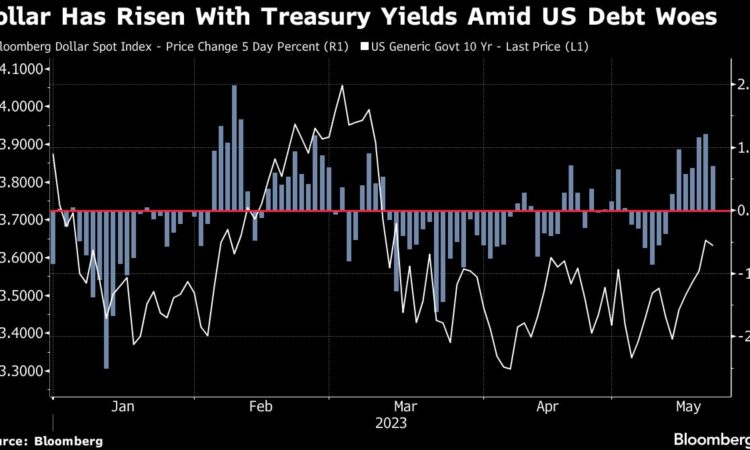
(Bloomberg) — Investors are girding for spikes in currency volatility and losses in equities should US lawmakers struggle to clinch a debt-limit deal this week.
Most Read from Bloomberg
Talks between politicians to end the deadlock hit another bump over the weekend with House Speaker Kevin McCarthy accusing White House officials of backtracking in negotiations on raising the debt-limit and setting federal spending levels. President Joe Biden, who’s returning from the G-7 summit, said he’s planning a call with McCarthy. Currency trading will begin at 5 a.m. Sydney, while futures contracts for Treasuries and US stocks start three hours later.
The debt-ceiling debate has become an unwelcome sideshow for investors already dealing with the uncertainty surrounding the Federal Reserve’s next policy decision in June. Strategists at JPMorgan Chase & Co. and Morgan Stanley have warned that an impasse threatens the outlook for equity markets, while traders have also piled into swaps and options for major currencies to hedge their portfolios. European Central Bank President Christine Lagarde appealed to US politicians to resolve the standoff in a TV interview aired Sunday.
“Despite encouraging headlines, history suggests lawmakers will take things down to the wire, which will add to market volatility,” said Carol Kong, strategist at Commonwealth Bank of Australia in Sydney. “If, and once, an agreement is reached, focus will quickly shift back to economic data and the FOMC, which I think will lead to further modest dollar gains.”
The back-and-forth between lawmakers has Wall Street preparing for the worst, with executives in trading, corporate and consumer banking in the nation’s three biggest lenders trying to predict how the government’s failure to pay bills would cascade through markets. Some are looking back to 2011, when a similar episode led to massive price swings across asset classes.
Still, investors may be underprepared. Some 71% of respondents to a recent Bank of America survey expect a resolution before the so-called X-date, the point at which the government exhausts options to fund itself, though without necessarily entering a default.
The S&P 500 Index rose last week on hopes that a resolution is close. A gauge of the dollar’s strength touched a two-month high, boosted by haven demand and stronger expectations for Fed hikes.
Yen, Stocks Bets
In addition to US assets, the yen, commodity currencies and emerging-market equities that are sensitive to swings in risk sentiment will also come under close scrutiny.
Goldman Sachs Group Inc. says the looming US debt ceiling is a “plausible catalyst” for hits to economic growth and stock markets.
“The EM template is fairly straightforward: large export markets, such as Korea, Mexico, and Taiwan, tend to underperform the most,” strategists including Caesar Maasry wrote in a note.
Most Read from Bloomberg Businessweek
©2023 Bloomberg L.P.



